MEN OF VALUE INTERVIEW : P.G. KASSEL
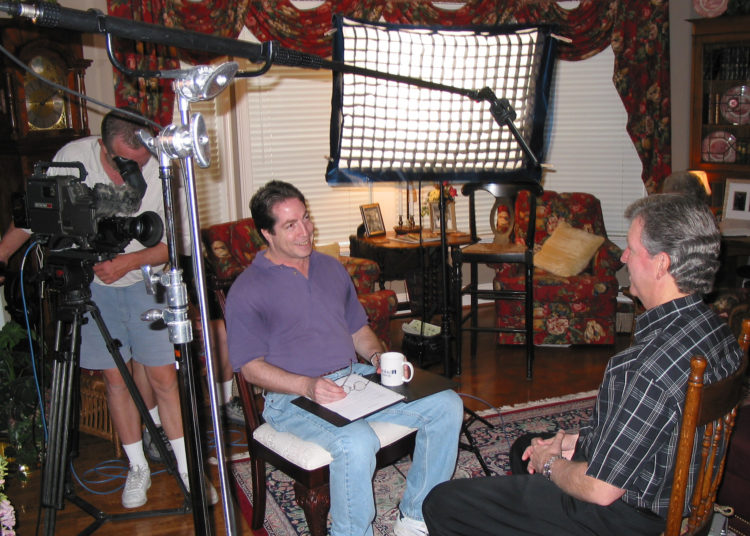
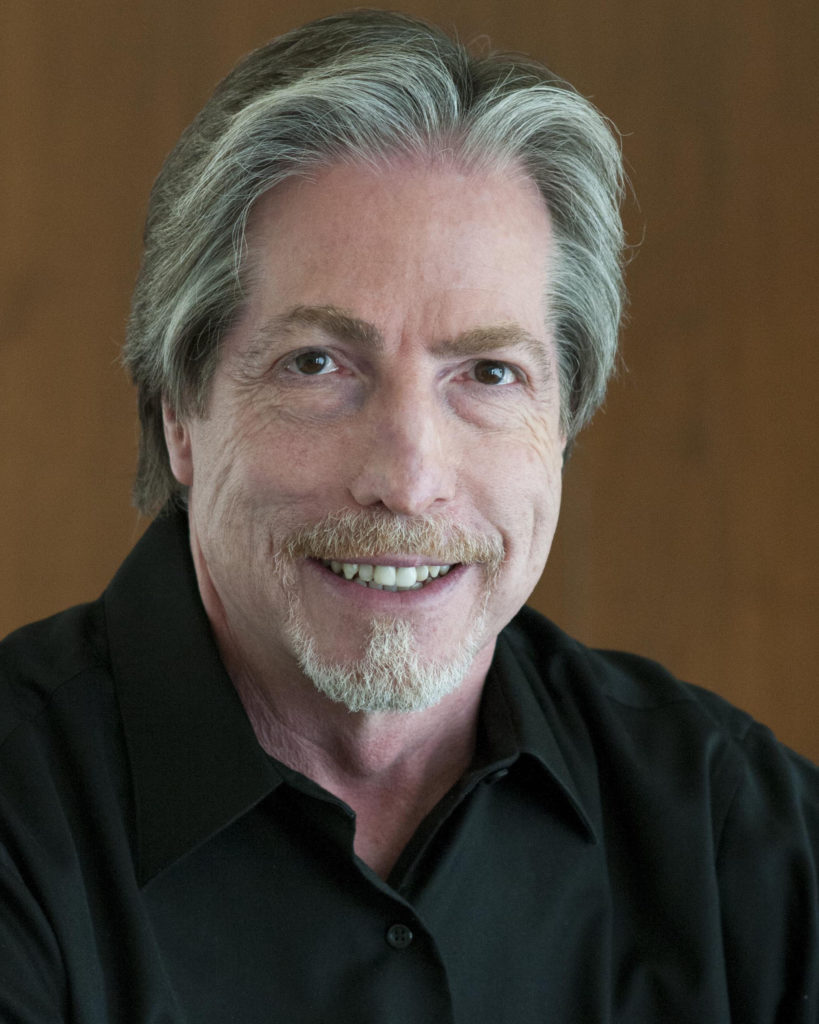
Philip Kassel has created memorable works in many areas of the arts including film, television, music and books. Kassel was born in Los Angeles, California, and grew up in Pasadena, California, where he lived most of his life. He received his B.A. in Production from the USC School of Cinematic Arts with an emphasis on writing and directing. His solid Christian values initially came from his parents. “My parents began instilling their values in me as a child, long before I knew what a Bible was, or had any conscious thoughts of God,” Kassel recalled. “You might say their values encompassed all the basics: valuing honesty and hard work, knowing the difference between right and wrong, practicing kindness and generosity, and valuing all life. I imperfectly lived by these values as I grew up. In my early thirties I gave my life to Christ and by doing so began understanding the Bible when I read it. The Word of God made it clear where all my parents’ values came from. They were not people of faith but they knew; their parents taught them. And of course, the Bible provided value-based teachings that went far beyond those basics. As my love for Christ grew, living my life on a foundation of Christian values became extremely important; it remains extremely important.”
Phil has penned many feature-length screenplays, several of which have been optioned by major production companies. His comedy-western, Small In The Saddle, was sold to MGM Studios as a directing vehicle for Academy Award winning writer-director David Ward (The Sting, Sleepless In Seattle), but before that it was almost bought by Disney. “In those days, I was earning a living but that was about all.” Kassel said. “My saddest story is back in the eighties there was the Disney Sunday movie and this friend of mine suggested I call this development executive named Eda Hallindan over there. So I called her and talked about my script Small in the Saddle and she said “Bring it over, I’d like to meet you” and suggested that I come right over.
“So I get a copy and I go over to the studio. Eda’s left me a pass at the gate. I go in and she’s a delightful woman, very cordial. She takes the script, ‘I’ll get to it as soon as I can, we’re always looking for something for the Sunday movie.’ Three days later, I was busy and out all day but when I came home there were like seven messages from Eda on my machine. This was prior to cell phones. So I called her up and she says, ‘Thank God you called,’ she said, ‘Do you own the rights to this outright? It’s free and clear?’ And I went ‘Yeah’ and she’s like ‘I love this script. I’ve been reading lines out of it to people who come into my office all day long, everybody is laughing. I wanted to make sure it was available before I pitch it to the executive board.’ Then she called me the next morning, She said, ‘Here’s what I want you to do, I want to take you to lunch on Friday. I will explain the deal to you. I’ll lay it all out. And then I’m going to take you back and introduce you to Peter Brown, who is the president in charge of production for the Disney Sunday Movie. He makes the formal offer, you shake hands, we get the paperwork going and it’ll be great.’ So we’re at lunch and Eda said, ‘I noticed from your credit list that you direct.’ And I said ‘yes’, she says, ‘well, we’re going to have you direct this movie.’ And I literally said, ‘Why?’ Because I was so stunned. You always have to fight tooth and nail to get a directing job in Hollywood. And she said, ‘Well, we’ve been trying to start new directors and you’re going to be fine. We’re going to get you a good cinematographer and good editors. We’ll pay you $80,000 for the screenplay and $140,000 to direct it. That’s the deal.’”
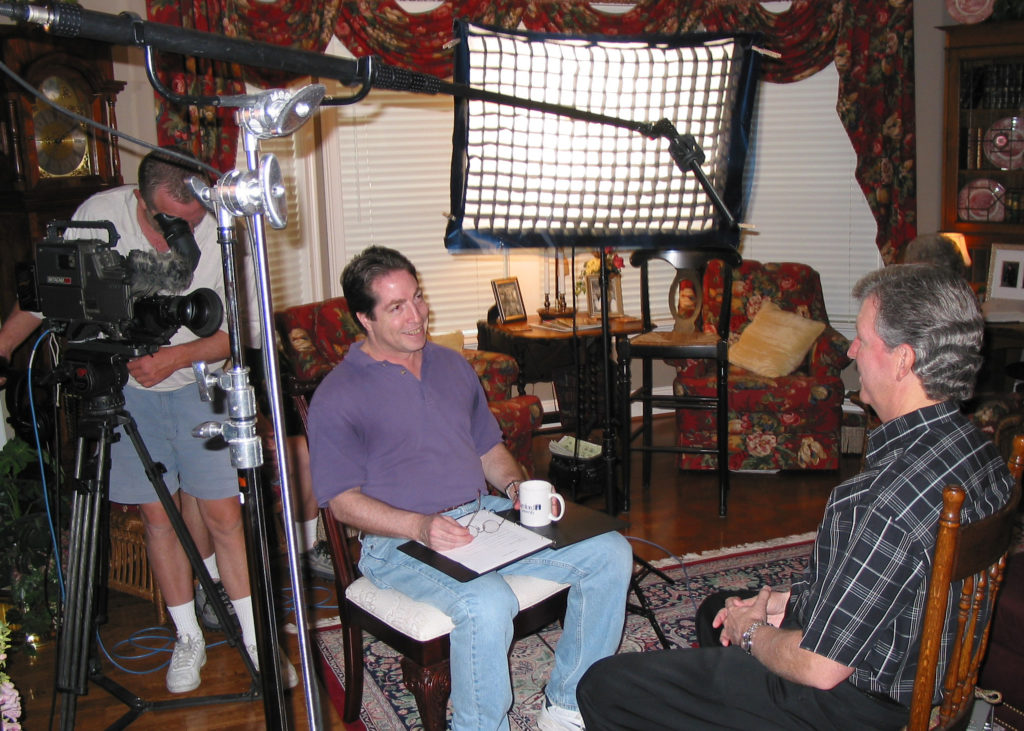
Conducting an interview for an episode of Secrets of Success in Florida
Phil Kassel was, of course, elated: “So we had a nice lunch, we were prob-ably there an hour and 15 minutes. Eda asked me questions about my career. And she is really interested. Then she said, ‘Okay, let’s go back. I’m going to introduce you to Peter. And he’s expecting us’. And Peter, because he’s the president, has an outer office with a secretary in the office, all quite large. His door is open. We walked into the outer office and Eda said, “Give me just a second I’m going to tell him we’re here.” She walked into his office. She was not in there twenty seconds and she came back with him and he said, ‘Do you have an agent?’ I said, ‘Yeah I’m represented by Polly Connell’ And he was like, ‘I know Polly.’ And so we talked about Polly for a minute and then he said, ‘You know, I read your script. Really enjoyed it. Thanks for coming in.’ And then he walked back into his office. And I looked at Eda and her mouth was open. I go ‘What happened?’ She said, ‘I’ll find out, go home.’ What happened was that Michael Eisner had just become head of Disney and when he was at Para-mount he had a no dust rule. No dust, no horses. He did not make westerns. While we were at lunch, Eisner got wind that they wanted to make my little comedy western, and he said, no. That was the end of it.”
Believe it or not, stories like this are not that uncommon in Hollywood. Where does God come in? I asked Kassel for his definition of freedom? “It’s easy to think of freedom as doing whatever you want,” he responded, “whenever you want. When you consider what that really means, it’s a rather unsavory proposition. At the risk of providing a Christian cliché answer, Jesus died to set us all free from the shackles of sin. That has to be the most important freedom of all, and it’s eternal”
While still attending USC he formed Philip Kassel Productions, originally to produce an educational film. Over a 30-year period he’s written and directed a variety of promotional, dramatic, educational, musical, and corporate projects. His clients have included Walt Disney Pictures, Sony Pictures, The King’s College, and the Scott Newman Foundation, just to name a few. “I raised my two children with the values of the Bible. Although I often failed, I did my best to be a daily example living those values and not just talking about them. ‘What would Jesus do?’ was a frequent question in our family and it was a great way to point my children in the right direction. The majority of my extended family are not believers. The main value they see in me as a Christ follower is that they always have somebody to say grace at holiday dinners. But that’s okay because they know what I believe and what I stand for. I’ll keep praying for them until they come around.”
How has Kassel’s values determined his own path in life? “I don’t think I ever lived life consciously thinking about my values or where they were taking me. I’m not sure that many people do. But values always come into play when there are choices to be made. Do we befriend that person or not? Should I ask that woman to marry me or not? Do I want to be involved in that project, work for that person, or take that career path? My values are always in play when answering those types of questions. Understanding and practicing the value of hard work has also strongly determined my path through life. I describe my career in the film and television industry as a “career of near misses.” I always managed to earn a decent living from it but many of the goals I set for myself, and many of the career dreams I had, were never met. But in the long run it didn’t matter because I kept trying, I kept working hard, and I’ve enjoyed many blessings through the years because of it.”
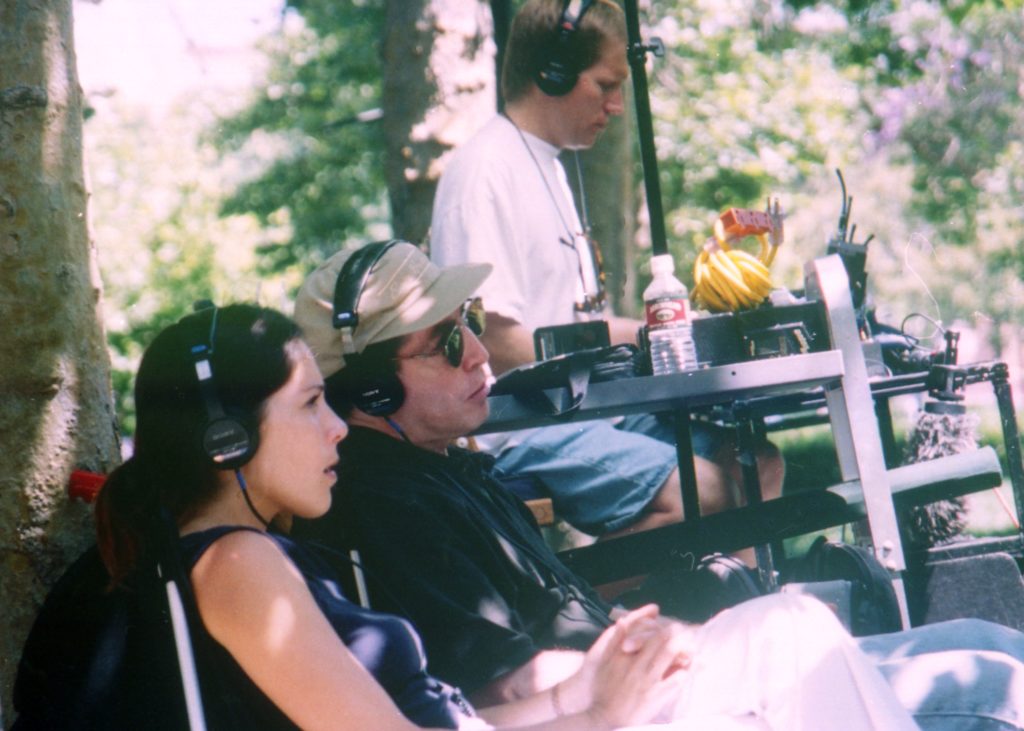
Directing on location at UCLA for Redline Studios with the producer looking on
During a brief encounter with the world of animation, Phil wrote several episodes of She-Ra, Princess of Power for Filmation Studios. He also worked on the development team for Filmation’s animated version of Ghostbusters, providing stories and scripts for the show’s first season. In documentary television, working with the independent production company Redline Studios, Phil developed the inspirational business biography television series, Secrets of Success. He wrote and directed over 40 episodes for the series that were distributed internationally. At its peak of popularity, the show enjoyed a global audience of over 1.3 billion. Of all his work Phil is most proud of the promotional film-video projects he has written, produced, and directed for several major charitable and Christian organizations. Those projects raised hundreds of millions of dollars in donations and corporate services, and several of them are still currently used on an ongoing basis. Proceeds have been used to clothe, feed, and provide medical services to thousands of people across the United States, and to bring the message of the Bible to people around the world.
Philip Kassel served as both President and Executive Director of the USC Cinema-Television Alumni Association shortly after it was formed. He has been an adjunct professor of screenwriting for both the Act One screenwriting program in Hollywood and Glendale College in California.
I asked him how his values have limited his life choices. “I think the best example of how my values may have limited some of my life choices are centered in my career. I can think of several projects I refused to be a part of because of questionable content that didn’t reflect my values. There were times I refused to work with certain people because their values would be in direct conflict with mine. After I gave my life to Christ I made sure that every screenplay I wrote in some way contained my Christian values. That practice sometimes limited the kind of story I could tell. I wasn’t writing stories for Christians; I thought that was just preaching to the choir. But I always made sure my values were apparent in every project. Now that I’m a novelist I’m doing the same thing.”
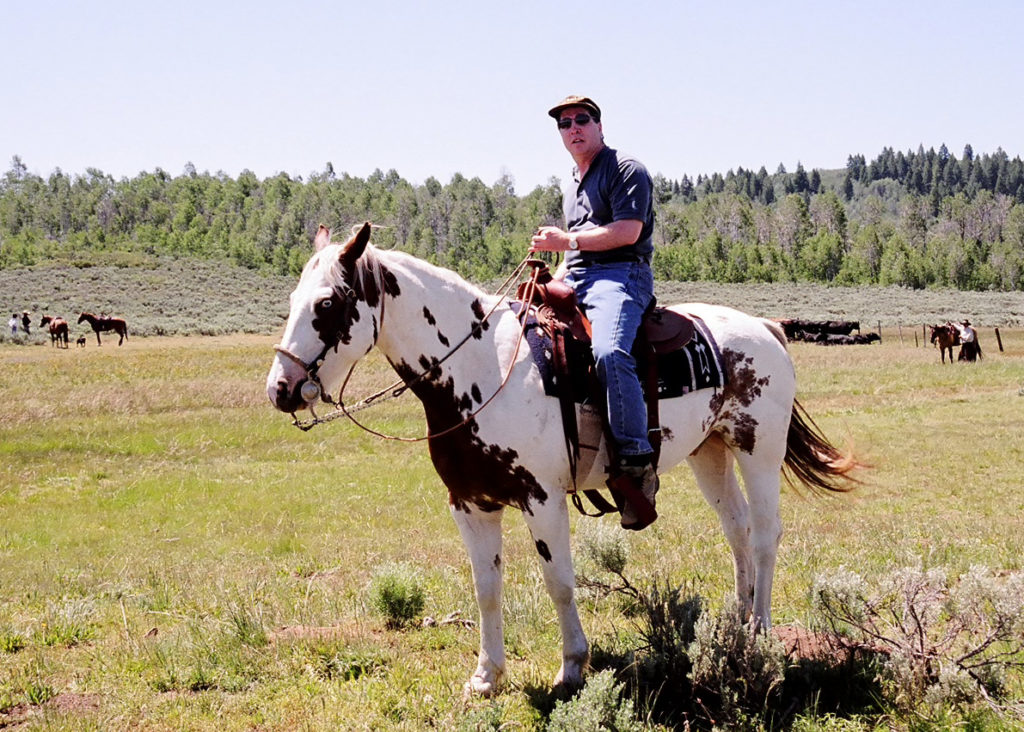
Directing an episode of Secrets of Success from horseback on a cattle drive in Glenns Ferry, Idaho
Writing as P.G. Kassel, Phil’s first thriller novel, Black Shadow Moon ~ Stoker’s Dark Secret Book 1, was published in October, 2015. “It’s a thriller about Bram Stoker writing Dracula,” Kassel explained. “Although a fictional tale it is thoroughly researched, featuring real-life characters, and accurately depicting the Victorian England of 1895.” The sequel, Black Hunters’ Moon ~ Stoker’s Dark Secret Book 2, followed in May, 2017. “I was reading the Seven-Per-Cent Solution by Nicholas Meyers, and there was a scene in it where Sherlock Holmes and Dr. Watson, for some reason, break into an apartment owned by Bram Stoker. And they find his Dracula manuscript, and because it’s written in letters and journals, they think it’s real. So I sat down and I think I wrote a half page synopsis of Bram Stoker wanting to write a book that would bring him fame and fortune and he ends up getting the research information straight from the horse’s mouth. And then I turned it into a screenplay. The screenplay has been optioned at least three different times, so I knew it had legs. Once I decided that I’m never going to write another screenplay on spec again, I thought maybe I should it do a novel, I’ve always wanted to see if I could do a novel and it’s been very successful. I originally authored the first book as a stand alone, but so many fans began pressuring me for a sequel that I managed to come up with a second story. In a perfect world there would be a third book but I think any story I might come up with would be weak and the readers would feel gypped. For me the strongest story has been told in the two books.”
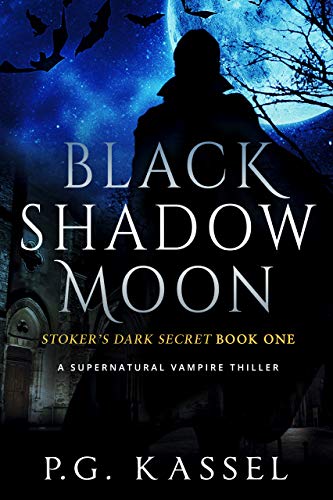
I asked Kassel who he looked to for life-examples, inspiration, and gui-dance? “Rock stars, big celebrities, movie stars, and handsome quarterbacks with supermodel wives. You know, the regular places. No, no, no. Just kidding. Throughout my life I’ve been blessed with a small group of wonderful friends, mentors, and teachers who have provided valuable guidance and offered wonderful inspiration. They are the kind of people who never hesitated to tell me the truth when I needed to hear it, no matter how hard the truth might be. Examples: My junior high school music teacher, Jim Coday, who taught me how to be a professional in the entertainment industry. Arthur Hiller, who mentored me in directing films, and how to treat people decently while doing it. Jim & Karen Covell who stood by my side through the most horrible years of my life, offering sound, biblical advice, guidance, and prayer. Coleman Luck who was always encouraging about my writing and has been a huge mentor of faith in the entertainment industry. John Raymond, a pastor who taught me that I should always keep my eyes on Jesus, and not pastors, congregation members, or Christian friends. He explained that all those other people would eventually screw up, let me down, or disappoint me… but Jesus would never change; he would always be constant.”
Phil Kassel had this to say about the state of our country. “Our nation was founded on biblical principles by men who loved God. They applied those principles to building and governing our country, and our nation grew and prospered under their leadership. It seems today that many of the people who lead our government are not acting for the good of our nation but more for their own personal agendas. Many of them trumpet that they are men/women of faith but it’s hard to see any real evidence of that faith. We live in an era where believing in God is considered a liability. Our nation is not only turning away from God, it’s working overtime to embrace practices and lifestyles clearly defined by the Word of God as being sinful. How many stories are there in the Bible about tribes or nations that turned their back on God? Did any of those tribes or nations experience happy endings in those stories? If the people of our nation continue turning their backs on God, no one should be surprised when God turns His back on us.”
Kassel’s novella, Dark Ride, was released in October, 2017 and he is cur-rently completing work on his third novel, a contemporary thriller titled Siphon that will be the first book in an ongoing series. When he is not writing Phil enjoys songwriting, playing and recording music, still photography, and skeet shooting. He has two grown children from his first marriage, both of whom he is immensely proud. Phil lives with his wife in Los Angeles, California.
He summed things up this way: As a man of faith I think every situation can be made better by focusing on God, asking for His guidance, and following it. If more people, including Christians, really lived God’s Word, our world would be a considerably better for it.”
That is why Philip Kassel is unquestionably a Man of Value.



No Comment